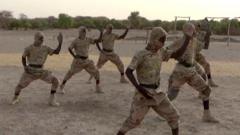Following a BBC Africa Eye investigation revealing excessive force used by Kenyan security personnel against protesters, human rights organizations are urging a thorough investigation into the killings of demonstrators. The government responds with criticism of the documentary's one-sided narrative.
Outcry for Justice: Calls to Investigate Kenyan Security Forces Following BBC Exposé

Outcry for Justice: Calls to Investigate Kenyan Security Forces Following BBC Exposé
Renewed demands for accountability in Kenya as human rights groups respond to a BBC documentary on police violence during protests over tax hikes.
Leading human rights organizations have intensified their demands for a thorough investigation into the violence perpetrated by Kenya's security forces during protests against tax increases last June. This renewed outcry comes on the heels of a revealing BBC Africa Eye investigation, which detailed how members of the police and military were implicated in the shooting deaths of three protesters outside Kenya's parliament. This has ignited widespread public anger and a call for justice.
Two prominent groups, Amnesty International and the Kenya Human Rights Commission (KHRC), insist that those officers identified in the documentary, who reportedly shot into the crowd, must "face the law." The Kenyan government has responded to the allegations through its spokesperson, Isaac Mwaura, who stated, "every life is important," insisting that the police are undertaking an investigation. He voiced discontent with the BBC's portrayal, suggesting it lacked fairness by not adequately representing the government's perspective.
In parliament discussions, MP John Kiarie accused the BBC of promoting a foreign agenda. Conversely, MP Millie Odhiambo encouraged a sober governmental response, recognizing the protests' legitimacy, and emphasized that attempts to silence the media would not be tolerated. In a preemptive move, the police service asserted that it could not conduct its own investigation and referred the matter to Kenya's Independent Policing Oversight Authority (IPOA).
The documentary, titled "Blood Parliament," utilized open-source data to analyze over 5,000 images and identified a policeman and a soldier who allegedly fired upon the unarmed protesters on June 25, 2024, a day when lawmakers voted on the contentious finance bill aimed at generating $2.7 billion. Amnesty International reported that the police clampdown resulted in at least 65 fatalities, numerous disappearances, and thousands of arrests, while the Kenyan government reported a lower death toll of 42.
Amid governmental pressure, the BBC canceled a scheduled screening of the documentary in Nairobi, expressing disappointment in not being able to facilitate public discourse as planned. The documentary remains accessible on BBC Africa's YouTube channel. Amnesty International noted that the documentary corroborated their previous findings of "unnecessary and excessive lethal force" against protesters and has urged the security forces to disclose actions being undertaken following the exposé.
The KHRC has alleged that "organized criminals in police and military uniforms" were deployed with the intent to kill innocent citizens, calling for President William Ruto to be held accountable. Many Kenyans have taken to social media to express their outrage over the government's handling of the situation and to demand justice for the slain protesters.
The IPOA has provided updates on ongoing investigations, uncovering that 60 deaths are under scrutiny, with 41 involving gunshot wounds. So far, 22 investigations have been completed. The main opposition coalition accused the government of premeditated execution of peaceful protesters. Some legislators have spoken out against the documentary, claiming it could incite violence, while others have defended it, calling for narratives of truth and justice to be shared openly.
In this charged atmosphere, the intersection of media, government responsibility, and public protest remains a focal point as Kenyans seek accountability for the tragic loss of life during the protests.





















